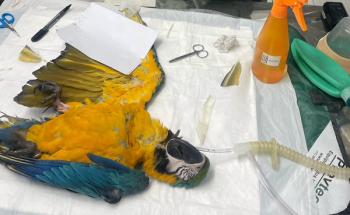
- dvm360 April 2019
- Volume 50
- Issue 4
New initiative aims to spread heartworm awareness, action
With its monthly Top 10 Cities Heartworm Report, CAPC hopes to spread awareness of the growing threat of heartworm disease and prompt conversations in the clinic about the importance of year-round preventives and annual testing.
According to the
The cities that made the top 10 in February differ completely from those on the January top 10 list. In fact, only three states-California, New Jersey and Texas-made both lists, underscoring the fact that this disease is a threat to pets throughout the country. Here's the breakdown:
˜The spread of heartworm disease is linked to four factors:
> Mosquito microclimates and changing weather patterns: Mosquitoes can thrive under the worst of weather circumstances and regardless of locale. “No matter the temperature, mosquitoes can thrive in sewers, stormwater drains, crawl spaces, alleys and other warm spaces where they survive and feed through winter months,” said Craig Prior, BVSc, CVJ, past president of the CAPC board of directors, in a press release from the organization.
> Increasing pet travel: Pet owners in our increasingly mobile society travel extensively, often with their four-legged friends in tow, increasing exposure to both mosquito-friendly climates and potentially infected animals.
> Rescue dog transport: The “Adopt, Don't Shop” mentality of pet acquisition means that more adoptable animals are being shipped across the country, often from areas of higher heartworm prevalence to areas of much lower prevalence, with many of these animals not tested or treated for heartworm.
> Noncompliance with preventives: Many pet owners, particularly cat owners and those who live in areas that historically have seen very little heartworm disease, don't protect their pets year-round against heartworm.
CAPC hopes that this new monthly report, along with its monthly
Heartworm disease, which is easy and cost-effective to prevent, can be devastating to pets, causing lifelong damage to their pulmonary arteries and potentially shortening life expectancy, Dr. Prior said. And it is very expensive to treat.
"Most people consider their pets as family members and wouldn't knowingly expose them to infection with a potentially fatal disease that can ultimately compromise the length and quality of their lives. Yet millions who fail to protect their pets every month from heartworm infection are doing just that,” Dr. Prior said. “The risk just isn't worth it. Heartworm preventives are affordable, safe and effective. This is why CAPC recommends all pets, no matter where they live, be tested annually and placed on heartworm preventives 12 months of the year.”
Articles in this issue
over 6 years ago
Commentary: Alvins trip to the veterinarianover 6 years ago
The future of veterinary medicineover 6 years ago
Laser therapy dosing explainedover 6 years ago
Can't we just sit tight sometimes?over 6 years ago
dvm360 Hospital Design Competition announces 2019 winnersover 6 years ago
Reexamining the early spay-neuter paradigm in dogsover 6 years ago
Dangerous new tick species migrating to North Americaover 6 years ago
Petplan gives North American awards at VMXover 6 years ago
Letter to dvm360: More options for intestinal parasite controlNewsletter
From exam room tips to practice management insights, get trusted veterinary news delivered straight to your inbox—subscribe to dvm360.






